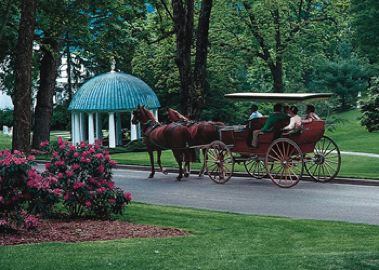 The tanking economy has taken down many a high-profile business with it, and hotels are no exception.
The tanking economy has taken down many a high-profile business with it, and hotels are no exception.
The owner of the historic Greenbrier Hotel in West Virginia announced yesterday that it is filing for bankruptcy and will sell the renowned property to a unit of Marriott International.
CSX Corporation, parent company of The Greenbrier Hotel Group, said the sale was necessary because the iconic landmark had fallen victim to the recession and had racked up close to $500 million in debt.
The Marriott deal was signed yesterday, though several other potential buyers were reportedly approached prior to that, including Donald Trump.
The 96-year-old Greenbrier, which is located in White Sulphur Springs, West Virginia, is one of the South’s most renowned hotels. In addition to royalty and captains of industry, every U.S. President has stayed in the resort’s Presidential Suite, and the property boasts an underground bunker that was originally intended to be used to shelter Congress in the event of a nuclear holocaust.
Some have speculated that the quiet antebellum style of the Greenbrier is no longer appealing to vacationers, who seek more “bang” for their buck when staying in a hotel.
Though the grounds do feature a world-famous golf course, CSX has been lobbying the state legislature for years to allow casino gambling at the Greenbrier in order to boost off-season occupancy rates.
 The Marriott deal will infuse up to $130 million into the property over the next seven years, saving hundreds of jobs. It will also give management time to modernize the hotel and come up with a strategy to attract a younger clientele.
The Marriott deal will infuse up to $130 million into the property over the next seven years, saving hundreds of jobs. It will also give management time to modernize the hotel and come up with a strategy to attract a younger clientele.
The Greenbrier is not the only high-profile hotel to find itself facing difficulty in recent months.
The St. Regis Hotel in Detroit, the Palace Station Hotel in Las Vegas, the Tropicana in Atlantic City and the Ilikai in Honolulu are already in or exploring filing Chapter 11 bankruptcy protection.
Plummeting occupancy rates have created a cash-flow crisis in the hotel industry, resulting in a stunning 36 percent of properties finding themselves unable to pay back loans and mortgages.
Hotel industry analysts say that most customers staying in troubled hotels will continue to experience business as usual, because hotels are contractually obligated to maintain certain standards of service.
However they warn that those who are planning a wedding or other large function may want to book it at a hotel that is not facing bankruptcy, because they may not get their deposit back if a cancellation is necessary.
By Karen Elowitt for PeterGreenberg.com.
Related links: Reuters, Washington Post, West Virginia Register-Herald, USA Today
Related links on PeterGreenberg.com:












